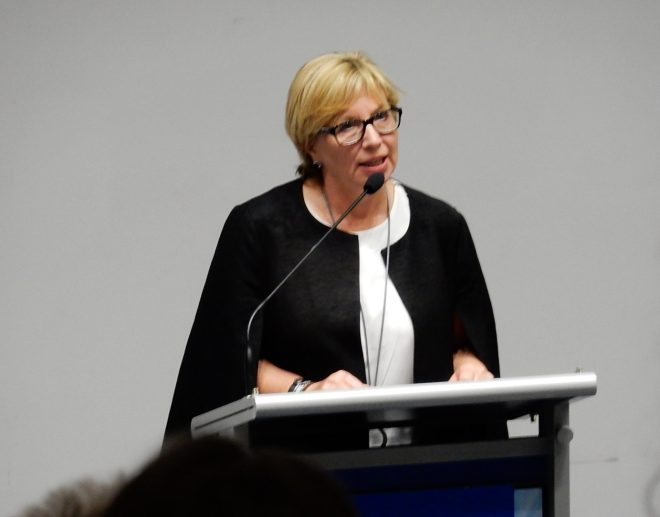The Royal Commission into Family Violence (“the Royal Commission”) delivered its final report to the Victorian Government on 29 March 2016. Following the release of the report, the Government committed to implementing the report’s 227 recommendations, and dedicating over half a billion dollars towards family violence prevention and response over the next two years.
The Royal Commission represents a significant step to address the alarming rates of family violence in Victoria. As the first state to undertake a comprehensive review into family prevention and response activities, Victoria is a national leader in this space.
About the Royal Commission
The Victorian Government established the Royal Commission in February 2015 in recognition of the need to invest in family violence reforms. During the establishment of the Royal Commission, Premiere Daniel Andrews declared family violence as “a national emergency” and Victoria’s “number one law and order issue.”
The Royal Commission undertook a rigorous, 13-month process that included receiving information through community consultations, written submissions, public hearings (including over 200 witnesses), data collection, literature reviews, discussions with experts and commissioned research.
The report provides an analysis of a range of topics including:
- Risk assessment
- Information sharing
- Service system pathways
- Police and Courts
- Offences and sentencing
- Housing
- The role the health system, faith communities and workplaces
- Financial security
- Recovery
- The experience of children and young people
- People from diverse communities
- System governance and oversight
- Industry planning
- Primary prevention
Key Findings & Recommendations
Sustainable governance structures
The Royal Commission recommends a whole-of-government approach to family violence, noting that family violence should be a core area of responsibility for government, its departments and agencies. This includes establishing governance structures, such as an independent statutory Family Violence Agency to oversee and monitor systemic improvements. Further, it recommends long-term and sustainable investment to effectively meet the current demands on the system, and to initiate the necessary reforms.
Cross-sectoral collaboration
The report recommendations call for greater transparency and cooperation between sectors, including the creation of a Statewide Family Violence Action Plan to guide prevention and response activities.
Children and young people
The Royal Commission gives particular focus to children and young people, and recommends investment in counseling and homelessness support programs. With respect to primary prevention, it recommends greater investment in expanding programming to help develop respectful relationship education in schools.
Diverse communities
The Royal Commission recognises a diversity of experiences of family violence within the Victorian population and the importance of utilising tailored approaches to reach all population groups. It acknowledges how the inersectionality of attributes can ultimately compound a person’s experience of violence and discrimination.
In particular, the report highlights the unique experiences of family violence for Aboriginal and Torres Strait Islander women, and provides recommendations to fund culturally appropriate services, community initiatives, and community-led violence prevention programs. Additional focus is given to the experiences and necessity to provide funding to support diverse population groups such as people from culturally and linguistically diverse backgrounds, older people, faith communities, people with disabilities, and lesbian, bisexual, transgender and intersex communities.
Response
The Royal Commission recommends sustainable funding to support specialist family violence services in order to meet the current demand on services. There are also a number of recommendations for police in recognition that they are at the front-line of family violence interventions, including the immediate introduction of a trial for body cameras. Additional funding for workplace-based initiatives is recommended to prevent and respond to family violence (e.g. paid family violence leave and the promotion of gender-equitable workplaces), and also for the Victorian Government to model best practice workplace policies.
Research and evaluation
In order to build a more robust evidence base on best practice prevention and response activities, the Royal Commission recommends additional funding to support research and evaluation, increased data collection and monitoring.
In addition to these key areas, the Royal Commission recommends a number of new approaches for systemic reform. They include:
- the introduction of state-wide safety hubs that will provide comprehensive support services to victims
- law reform to enable the government to approve a family violence risk assessment and ensure all agencies are compliant with risk assessments, procedures and practice
- stronger perpetrator programs and increased monitoring and oversight by agencies
- the establishment of more specialist family violence courts to deal with criminal, civil and family violence law matters at the same time
- workplace training in key areas – including the health system and schools
- stronger perpetrator programs and increased monitoring and oversight by agencies
- new laws to ensure that privacy considerations do not trump victims’ safety – with a “Central Information Point” to funnel information about perpetrators to the Hubs

Rosie Batty. Michael Coughlan/Flickr.
Progress to Date
A week prior to the release of the report, former Australian of the Year, Rosie Batty was appointed to lead a new Victims Survivors Advisory Council that will enable survivors of family violence to voice their views on service response to family violence.
Following the release of the report, the Victorian Government committed to a $572 million statewide funding boost over the next two years (2016/17) to implement 65 of report’s recommendations. This package includes:
- $152 million to fund the construction of 180 new crisis accommodation units, 130 new special housing properties for victims and upgrades to existing facilities
- $122 million to expand programs that give intensive support for children including family services and counseling, and reform of the child protection system
- $61.6 million to fund family violence prevention schemes including school programs
- $25.7 million to work with Aboriginal communities including prevention and early intervention programs, new approaches to dispute resolution, and programming for Aboriginal women
- $24 million to reform the justice system.
The report and its recommendations have been well received within the community and the family violence sector. Many regard it as a key milestone to combat family violence, and the first time recognition has been given to the significance of the issue.





